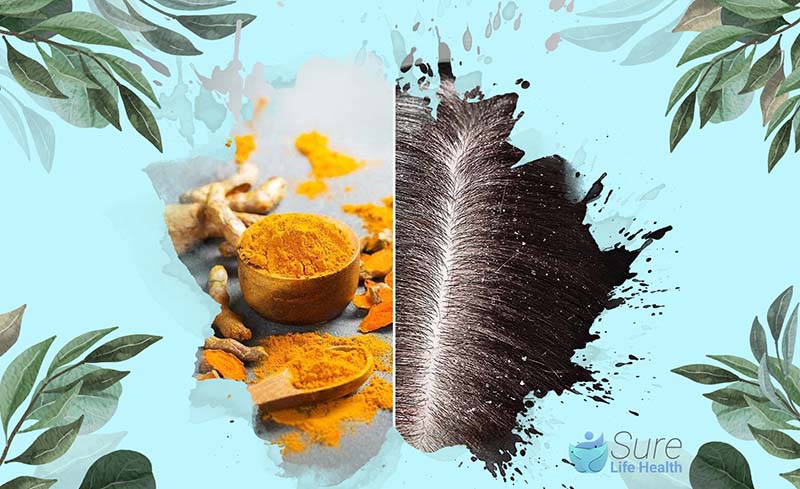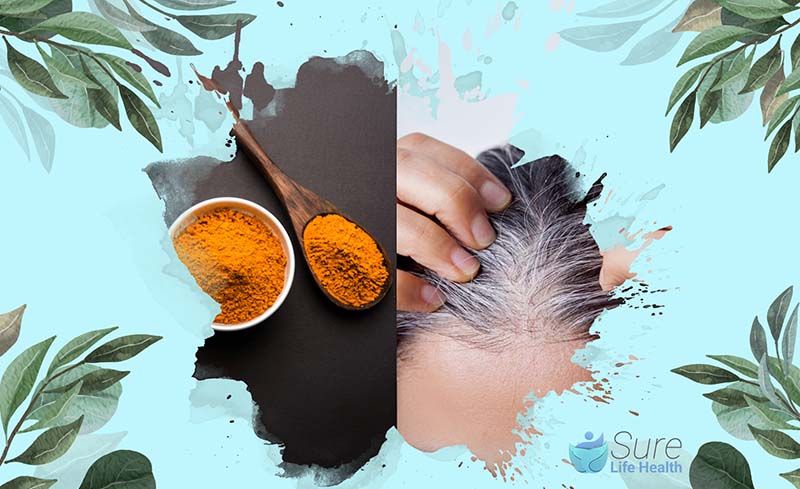If you’re grappling with hair issues such as dandruff, hair loss, or an itchy scalp, you may be searching for natural remedies to boost your hair’s health and restore its vitality.
Today, we’re addressing the question “Is turmeric good for hair?” by exploring the benefits of this time-honored solution.
Learn how turmeric can improve scalp health, prevent hair loss, and provide your locks with the extra nourishment they need. This blog is your comprehensive guide to understanding how turmeric can contribute to healthier.
Is Turmeric Good for Your Hair?
Turmeric is great for your hair and scalp. It’s often used in hair masks to tackle issues like dandruff, psoriasis, and even mild acne.
This natural remedy helps nourish your scalp and creates a healthy environment for hair growth, though we don’t know much about its direct impact on hair growth yet. But for scalp health, it’s definitely a winner.
Notes:
- Mix turmeric with ingredients like yogurt or coconut oil for even better results in your hair masks.
- Always do a patch test before using turmeric on your skin to make sure it doesn’t cause any irritation, especially if you have sensitive skin.

Benefits of Turmeric for Hair
Turmeric offers notable advantages for your hair, mainly due to its anti-inflammatory properties, as certified trichologist William Gaunitz highlights.
Its versatile nature makes it a sought-after ingredient in various hair care products, ranging from shampoos and conditioners to hair masks and treatment oils. Incorporating turmeric into your hair care routine can lead to several benefits:
Controls Oil Production
Turmeric’s anti-inflammatory and anti-microbial properties are particularly effective in managing oily hair and scalps, explains Engelman.
These properties help inhibit the growth of microorganisms that contribute to excessive oiliness, a common issue for many individuals.
Fights Dandruff
Turmeric’s anti-inflammatory and antibacterial properties are effective in combating dandruff, explains Engelman.
Left untreated, dandruff can contribute to hair loss. Using turmeric on your hair helps maintain scalp health, a crucial factor for healthy hair and new hair growth.

Improves Scalp Health
The anti-inflammatory properties of turmeric contribute to overall scalp health. According to board-certified cosmetic dermatologist and Mohs surgeon Dendy Engelman MD, FAAD, the healing properties of turmeric naturally alleviate scalp irritation without the need for artificial ingredients.
Adding turmeric to your hair care routine provides a natural boost for a healthy scalp and hair.

Prevents Hair Loss
Turmeric’s anti-inflammatory prowess is invaluable in addressing thinning hair, potentially stimulating growth. Gaunitz explains that inflammation is a factor in many hair loss cases, making turmeric’s ability to reduce inflammation crucial.
This reduction in inflammation can lessen the impact of pattern hair loss and other inflammatory conditions affecting the scalp and hair follicles.

Protects Hair from Environmental Stressors
Turmeric’s antioxidant properties are a boon for safeguarding hair against environmental stressors.
Free radicals, known for causing damage to hair, scalp, and skin, are effectively combated by antioxidants like turmeric. Consequently, hair follicles remain shielded from harm caused by these harmful molecules.
Understanding How Turmeric Affects Hair Growth
Turmeric offers several benefits for hair, primarily attributed to its anti-inflammatory properties. Let’s delve into how it can promote hair growth:
- Stimulates Blood Circulation: Turmeric contains the compound curcumin, which has been found to enhance blood circulation in the scalp. This increased blood flow ensures that more nutrients and oxygen reach the hair follicles, fostering stronger and healthier hair growth.
- Antimicrobial Effects: Additionally, turmeric exhibits antimicrobial properties that combat fungal infections, which may otherwise hinder hair growth by affecting scalp health.
- Prevents Hair Loss: Thanks to its anti-inflammatory properties, turmeric is beneficial for addressing thinning hair. By potentially stimulating growth and thwarting hair loss, it serves as a proactive measure in maintaining healthy hair.
Utilizing Turmeric for Hair Care
Turmeric can be utilized for hair care through both topical application and oral consumption. According to Gaunitz, for oral use, turmeric can be integrated into your daily routine following standard recommendations.
Depending on the turmeric concentration, a daily dosage ranging from 500mg to 2000mg is advisable. However, it’s essential to note that if you opt for oral consumption, avoid combining turmeric with medications that may slow blood clotting, such as aspirin and ibuprofen.
For expert-approved methods of using turmeric in your hair care routine, consider the following:
- Apply as a mask: Engelman suggests creating a moisturizing DIY turmeric mask by combining equal parts olive oil and turmeric, with the option of adding a small amount of honey for extra moisturization. Apply the mask evenly to your hair and leave it on for 15 to 20 minutes to allow the ingredients to penetrate. Then, rinse and cleanse your hair as usual with your preferred shampoo and conditioner.
- Nourish your scalp: Engelman recommends blending turmeric with essential oils like lavender to concoct a soothing scalp treatment that promotes scalp health.
- Take as a supplement: In addition to topical application, turmeric can be consumed as a supplement to reap its benefits for hair and skin. Gaunitz suggests internal consumption of turmeric for systemic inflammation reduction, emphasizing its potential impact on overall hair health.
- Use as a shampoo: Incorporating turmeric into your hair care routine is effortless with shampoos containing this “golden goddess” ingredient. Simply use as you would any other shampoo—cleanse, rinse, and repeat for optimal results.

Possible Adverse Effects of Turmeric Application on Hair
Turmeric is generally considered a safe ingredient, but like any supplement, it’s crucial to use it as directed to avoid potential side effects and safety concerns.
According to the National Center for Complementary and Integrative Health (NCCIH), curcumin and turmeric products are deemed “probably safe” when used orally or applied topically in recommended amounts.
However, consuming large quantities of turmeric can lead to digestive issues such as nausea, diarrhea, and abdominal pain.
When applied directly to the skin, turmeric may cause contact dermatitis or urticaria (hives).
Reported side effects of curcumin include headache, diarrhea, rash, yellow stool, and elevated levels of certain enzymes, such as alkaline phosphatase and lactate dehydrogenase.
Individuals with existing allergies to plants of the Curcuma genus may be more susceptible to side effects from turmeric or curcumin.
To minimize the risk of side effects, it’s essential to adhere to the recommended dosage of turmeric and/or curcumin products.
If you experience persistent or severe side effects, it’s advisable to consult your healthcare provider for personalized assistance and guidance.
Additionally, it’s important to note that turmeric is a potent natural dye, which means it can stain clothing easily. Whether cooking with turmeric or applying it to the skin, take care to avoid contact with clothes, towels, or other items you don’t want to turn yellow.

Does Turmeric Kill Hair Follicles?
Turmeric is often employed for hair removal on the skin, but it doesn’t have the capacity to kill hair follicles. In fact, turmeric may even stimulate blood flow, potentially promoting hair follicle growth.
Moreover, its antimicrobial, antioxidant, antiseptic, and anti-inflammatory properties make it a beneficial hair cleanser. By keeping the scalp free from dirt, product residue, buildup, or grime, turmeric supports overall scalp health and hair cleanliness.
Conclusion
In conclusion, “Is turmeric good for hair?” Yes, it certainly is. Turmeric’s anti-inflammatory, antimicrobial, and antioxidant properties make it an excellent choice for promoting scalp health and preventing hair loss.
By incorporating turmeric into your hair care routine, either topically or as a supplement, you can enjoy healthier, more vibrant locks. Always remember to use it as recommended and perform a patch test if applying it directly to the skin.
Don’t miss the opportunity to explore further insightful content from SurelifeHealth.
Professor Gaye Cunnane, PhD, MB, FRCPI
As the Director of Health and Wellbeing at RCPI, Professor Gaye Cunnane is at the helm of initiatives aimed at enhancing the health and well-being of RCPI Trainers and Trainees. Her role extends beyond administration; she is also a respected clinical professor of rheumatology and a consultant rheumatologist at Trinity College Dublin (TCD) and St James’s Hospital. Prof. Cunnane’s medical journey began at TCD, where she graduated from medical school, and her path has been marked by both clinical and academic excellence.
After completing her basic clinical training in medicine, she embarked on PhD studies at University College Dublin and St Vincent’s University Hospital. Her research during this period was focused on prognostic markers in early inflammatory arthritis, a project that saw her collaborating with esteemed universities across Europe, including in Switzerland, The Netherlands, the UK, and Sweden.
Prof. Cunnane’s career took her to the University of California, San Francisco, where she spent three years delving into research on new treatments for lupus. Her academic prowess led her to the University of Leeds in 2001 as a senior lecturer, before returning to Ireland in 2003 to assume her current roles. She has also served as the National Specialty Director for Rheumatology training in Ireland, Programme Director for Basic Specialist Training with RCPI, and as a past President of the Irish Society for Rheumatology.
PUBLISHED ARTICLES
“Rheumatic disease differentiation using immunoglobulin G sugar printing by high-density electrophoresis”: Published in The Journal of Rheumatology, this study reflects her in-depth investigation into rheumatic diseases.
“Benefits of exercise in patients with rheumatoid arthritis: a randomized controlled trial”: This research work, highlighting the positive impact of exercise on rheumatoid arthritis, underscores Prof. Cunnane’s dedication to practical, patient-centered research.
Additionally, Prof. Cunnane has made notable contributions to the Annals of the Rheumatic Diseases, discussing early referral, diagnosis, and treatment of rheumatoid arthritis. She has also been involved in a study on the NCBI platform investigating exercise benefits in rheumatoid arthritis patients.
Professor Gaye Cunnane’s career is a testament to her commitment to improving patient outcomes in rheumatology through rigorous research, clinical excellence, and dedicated teaching. Her work continues to influence the field of rheumatology, both in Ireland and internationally.

